Analysis of Leadership and Management Roles and Theories at Unilever
VerifiedAdded on 2020/10/22
|12
|3323
|427
Report
AI Summary
This report provides a comprehensive analysis of leadership and management practices within Unilever. It begins by defining and comparing the distinct roles and characteristics of leaders and managers, highlighting their differing responsibilities and approaches. The report then delves into various leadership theories and models, including situational, systems, and contingency leadership, discussing their applications and strengths within the context of Unilever's operations. It provides practical examples of how leaders and managers function within the organization, particularly in scenarios requiring immediate training and operational adjustments. Furthermore, the report examines the strengths and weaknesses of different leadership approaches and explores the impact of business environment factors on managerial decisions. Finally, it discusses key approaches to operational management and their relevance to Unilever's strategic objectives. The report uses Unilever as a case study to illustrate theoretical concepts and practical applications, offering valuable insights into effective leadership and management strategies in a multinational consumer goods company.
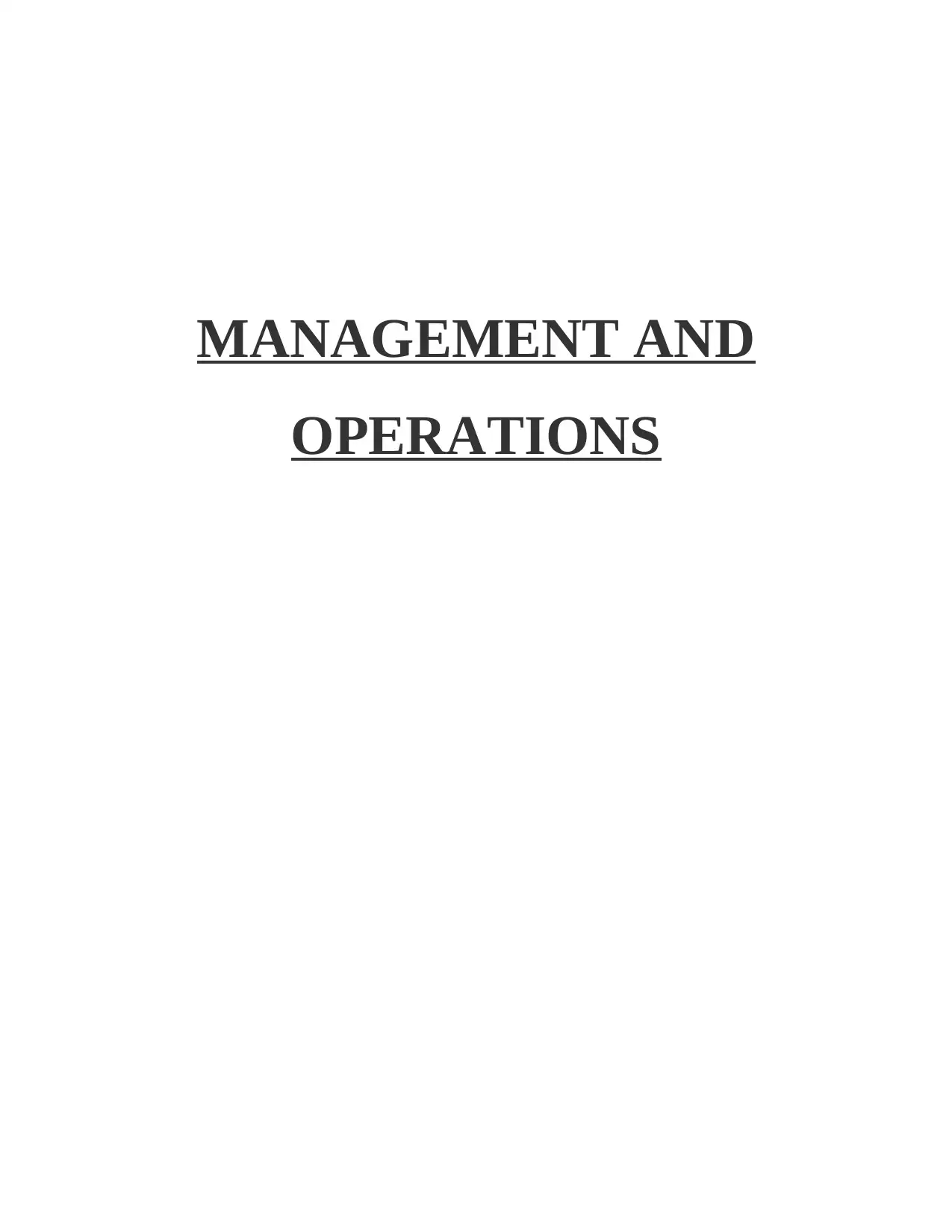
MANAGEMENT AND
OPERATIONS
OPERATIONS
Paraphrase This Document
Need a fresh take? Get an instant paraphrase of this document with our AI Paraphraser
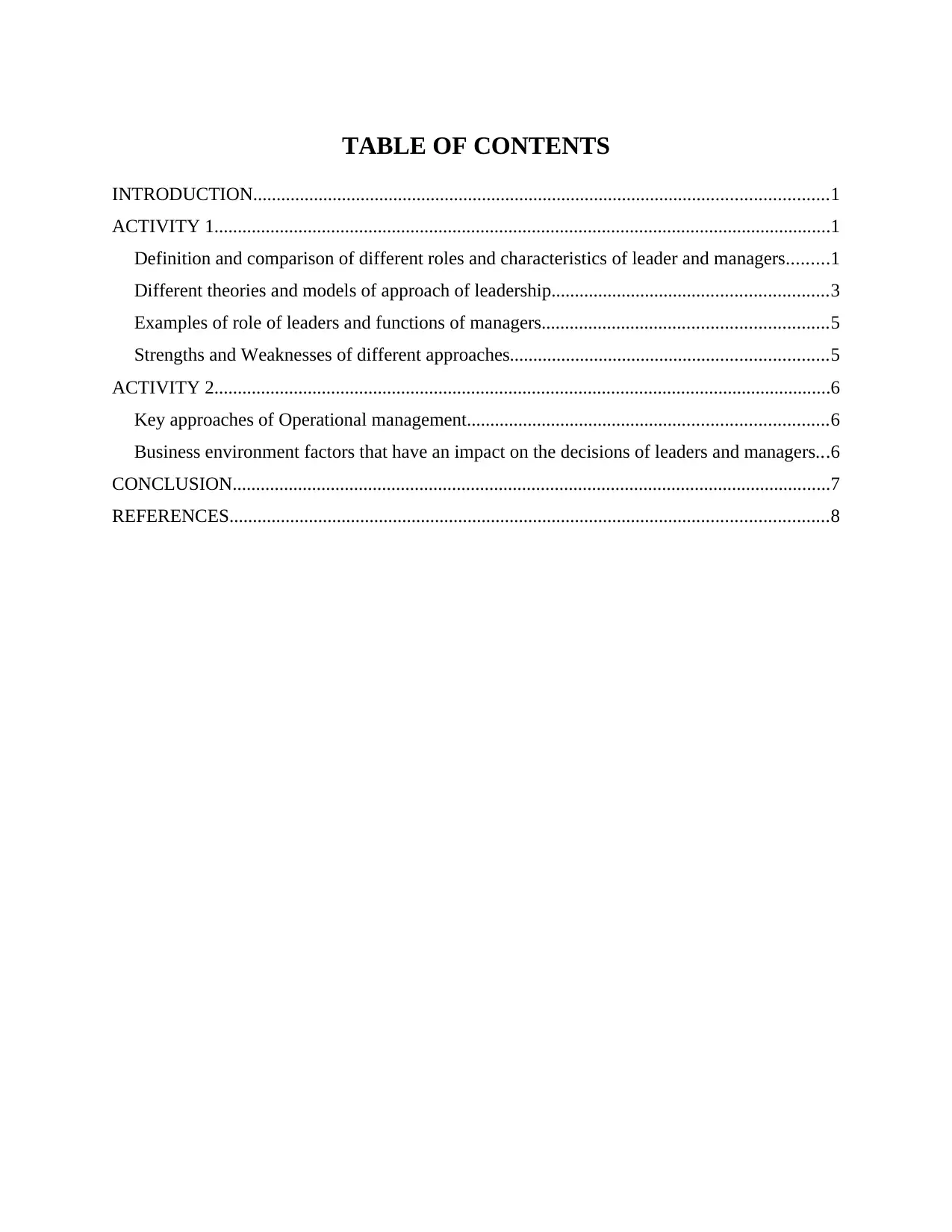
TABLE OF CONTENTS
INTRODUCTION...........................................................................................................................1
ACTIVITY 1....................................................................................................................................1
Definition and comparison of different roles and characteristics of leader and managers.........1
Different theories and models of approach of leadership...........................................................3
Examples of role of leaders and functions of managers.............................................................5
Strengths and Weaknesses of different approaches....................................................................5
ACTIVITY 2....................................................................................................................................6
Key approaches of Operational management.............................................................................6
Business environment factors that have an impact on the decisions of leaders and managers...6
CONCLUSION................................................................................................................................7
REFERENCES................................................................................................................................8
INTRODUCTION...........................................................................................................................1
ACTIVITY 1....................................................................................................................................1
Definition and comparison of different roles and characteristics of leader and managers.........1
Different theories and models of approach of leadership...........................................................3
Examples of role of leaders and functions of managers.............................................................5
Strengths and Weaknesses of different approaches....................................................................5
ACTIVITY 2....................................................................................................................................6
Key approaches of Operational management.............................................................................6
Business environment factors that have an impact on the decisions of leaders and managers...6
CONCLUSION................................................................................................................................7
REFERENCES................................................................................................................................8
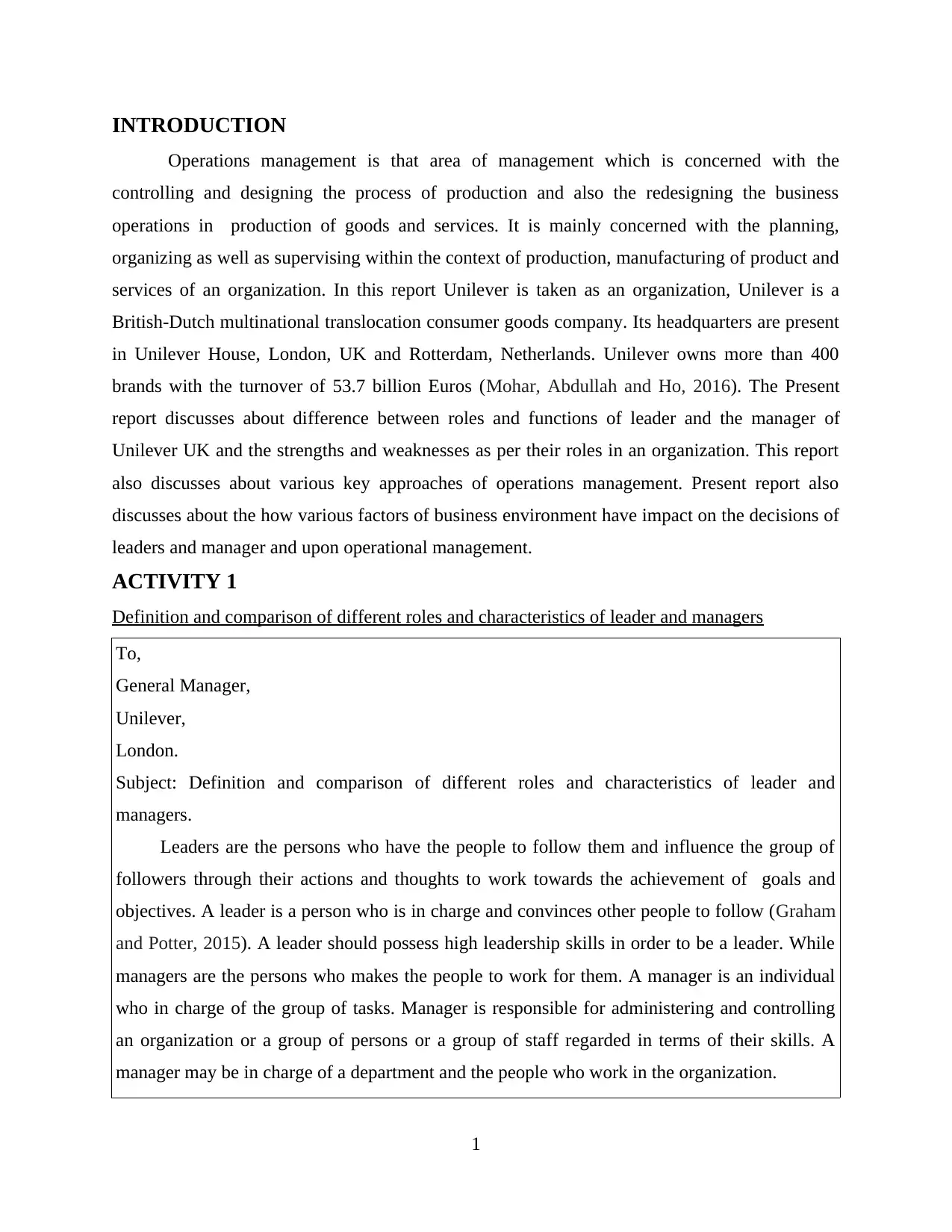
INTRODUCTION
Operations management is that area of management which is concerned with the
controlling and designing the process of production and also the redesigning the business
operations in production of goods and services. It is mainly concerned with the planning,
organizing as well as supervising within the context of production, manufacturing of product and
services of an organization. In this report Unilever is taken as an organization, Unilever is a
British-Dutch multinational translocation consumer goods company. Its headquarters are present
in Unilever House, London, UK and Rotterdam, Netherlands. Unilever owns more than 400
brands with the turnover of 53.7 billion Euros (Mohar, Abdullah and Ho, 2016). The Present
report discusses about difference between roles and functions of leader and the manager of
Unilever UK and the strengths and weaknesses as per their roles in an organization. This report
also discusses about various key approaches of operations management. Present report also
discusses about the how various factors of business environment have impact on the decisions of
leaders and manager and upon operational management.
ACTIVITY 1
Definition and comparison of different roles and characteristics of leader and managers
To,
General Manager,
Unilever,
London.
Subject: Definition and comparison of different roles and characteristics of leader and
managers.
Leaders are the persons who have the people to follow them and influence the group of
followers through their actions and thoughts to work towards the achievement of goals and
objectives. A leader is a person who is in charge and convinces other people to follow (Graham
and Potter, 2015). A leader should possess high leadership skills in order to be a leader. While
managers are the persons who makes the people to work for them. A manager is an individual
who in charge of the group of tasks. Manager is responsible for administering and controlling
an organization or a group of persons or a group of staff regarded in terms of their skills. A
manager may be in charge of a department and the people who work in the organization.
1
Operations management is that area of management which is concerned with the
controlling and designing the process of production and also the redesigning the business
operations in production of goods and services. It is mainly concerned with the planning,
organizing as well as supervising within the context of production, manufacturing of product and
services of an organization. In this report Unilever is taken as an organization, Unilever is a
British-Dutch multinational translocation consumer goods company. Its headquarters are present
in Unilever House, London, UK and Rotterdam, Netherlands. Unilever owns more than 400
brands with the turnover of 53.7 billion Euros (Mohar, Abdullah and Ho, 2016). The Present
report discusses about difference between roles and functions of leader and the manager of
Unilever UK and the strengths and weaknesses as per their roles in an organization. This report
also discusses about various key approaches of operations management. Present report also
discusses about the how various factors of business environment have impact on the decisions of
leaders and manager and upon operational management.
ACTIVITY 1
Definition and comparison of different roles and characteristics of leader and managers
To,
General Manager,
Unilever,
London.
Subject: Definition and comparison of different roles and characteristics of leader and
managers.
Leaders are the persons who have the people to follow them and influence the group of
followers through their actions and thoughts to work towards the achievement of goals and
objectives. A leader is a person who is in charge and convinces other people to follow (Graham
and Potter, 2015). A leader should possess high leadership skills in order to be a leader. While
managers are the persons who makes the people to work for them. A manager is an individual
who in charge of the group of tasks. Manager is responsible for administering and controlling
an organization or a group of persons or a group of staff regarded in terms of their skills. A
manager may be in charge of a department and the people who work in the organization.
1
⊘ This is a preview!⊘
Do you want full access?
Subscribe today to unlock all pages.

Trusted by 1+ million students worldwide
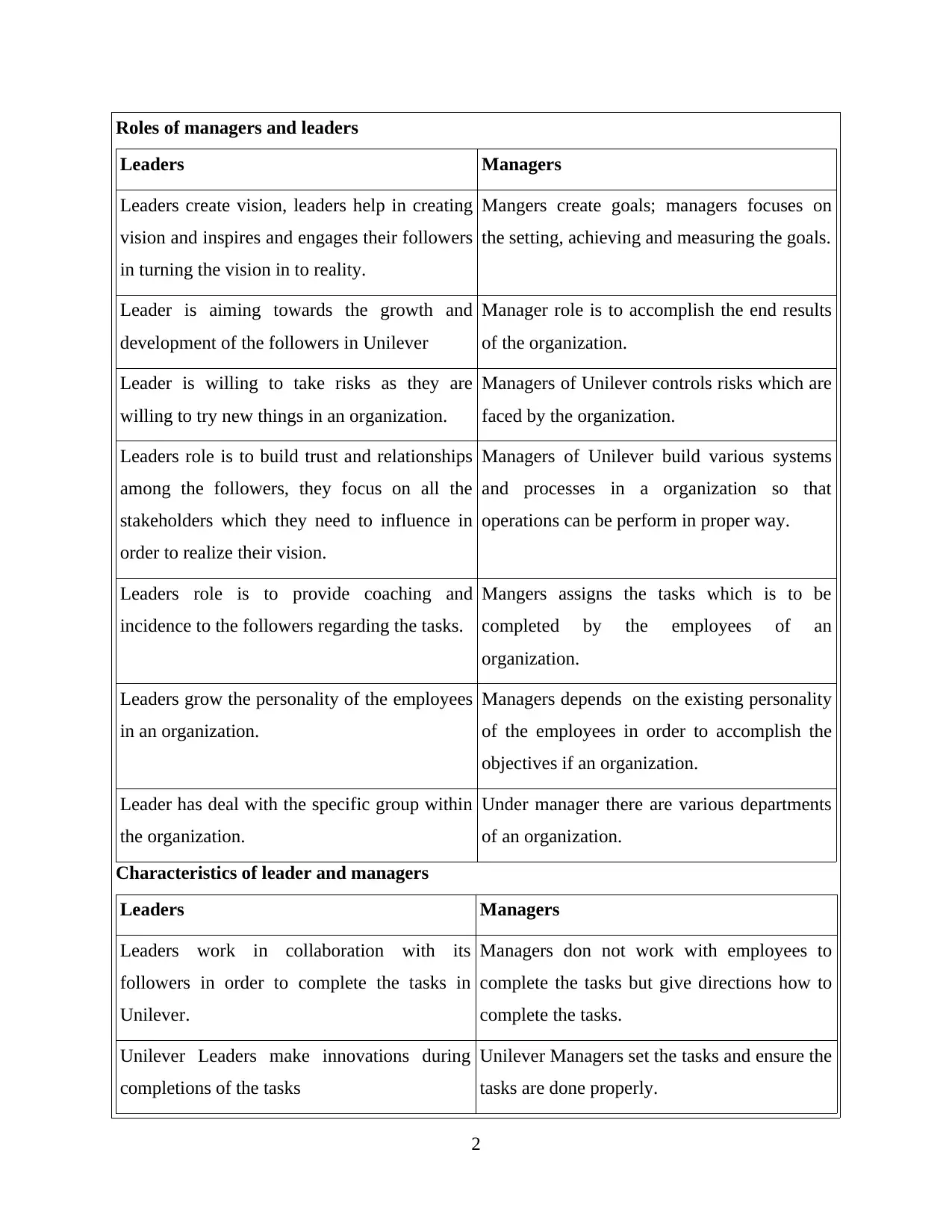
Roles of managers and leaders
Leaders Managers
Leaders create vision, leaders help in creating
vision and inspires and engages their followers
in turning the vision in to reality.
Mangers create goals; managers focuses on
the setting, achieving and measuring the goals.
Leader is aiming towards the growth and
development of the followers in Unilever
Manager role is to accomplish the end results
of the organization.
Leader is willing to take risks as they are
willing to try new things in an organization.
Managers of Unilever controls risks which are
faced by the organization.
Leaders role is to build trust and relationships
among the followers, they focus on all the
stakeholders which they need to influence in
order to realize their vision.
Managers of Unilever build various systems
and processes in a organization so that
operations can be perform in proper way.
Leaders role is to provide coaching and
incidence to the followers regarding the tasks.
Mangers assigns the tasks which is to be
completed by the employees of an
organization.
Leaders grow the personality of the employees
in an organization.
Managers depends on the existing personality
of the employees in order to accomplish the
objectives if an organization.
Leader has deal with the specific group within
the organization.
Under manager there are various departments
of an organization.
Characteristics of leader and managers
Leaders Managers
Leaders work in collaboration with its
followers in order to complete the tasks in
Unilever.
Managers don not work with employees to
complete the tasks but give directions how to
complete the tasks.
Unilever Leaders make innovations during
completions of the tasks
Unilever Managers set the tasks and ensure the
tasks are done properly.
2
Leaders Managers
Leaders create vision, leaders help in creating
vision and inspires and engages their followers
in turning the vision in to reality.
Mangers create goals; managers focuses on
the setting, achieving and measuring the goals.
Leader is aiming towards the growth and
development of the followers in Unilever
Manager role is to accomplish the end results
of the organization.
Leader is willing to take risks as they are
willing to try new things in an organization.
Managers of Unilever controls risks which are
faced by the organization.
Leaders role is to build trust and relationships
among the followers, they focus on all the
stakeholders which they need to influence in
order to realize their vision.
Managers of Unilever build various systems
and processes in a organization so that
operations can be perform in proper way.
Leaders role is to provide coaching and
incidence to the followers regarding the tasks.
Mangers assigns the tasks which is to be
completed by the employees of an
organization.
Leaders grow the personality of the employees
in an organization.
Managers depends on the existing personality
of the employees in order to accomplish the
objectives if an organization.
Leader has deal with the specific group within
the organization.
Under manager there are various departments
of an organization.
Characteristics of leader and managers
Leaders Managers
Leaders work in collaboration with its
followers in order to complete the tasks in
Unilever.
Managers don not work with employees to
complete the tasks but give directions how to
complete the tasks.
Unilever Leaders make innovations during
completions of the tasks
Unilever Managers set the tasks and ensure the
tasks are done properly.
2
Paraphrase This Document
Need a fresh take? Get an instant paraphrase of this document with our AI Paraphraser
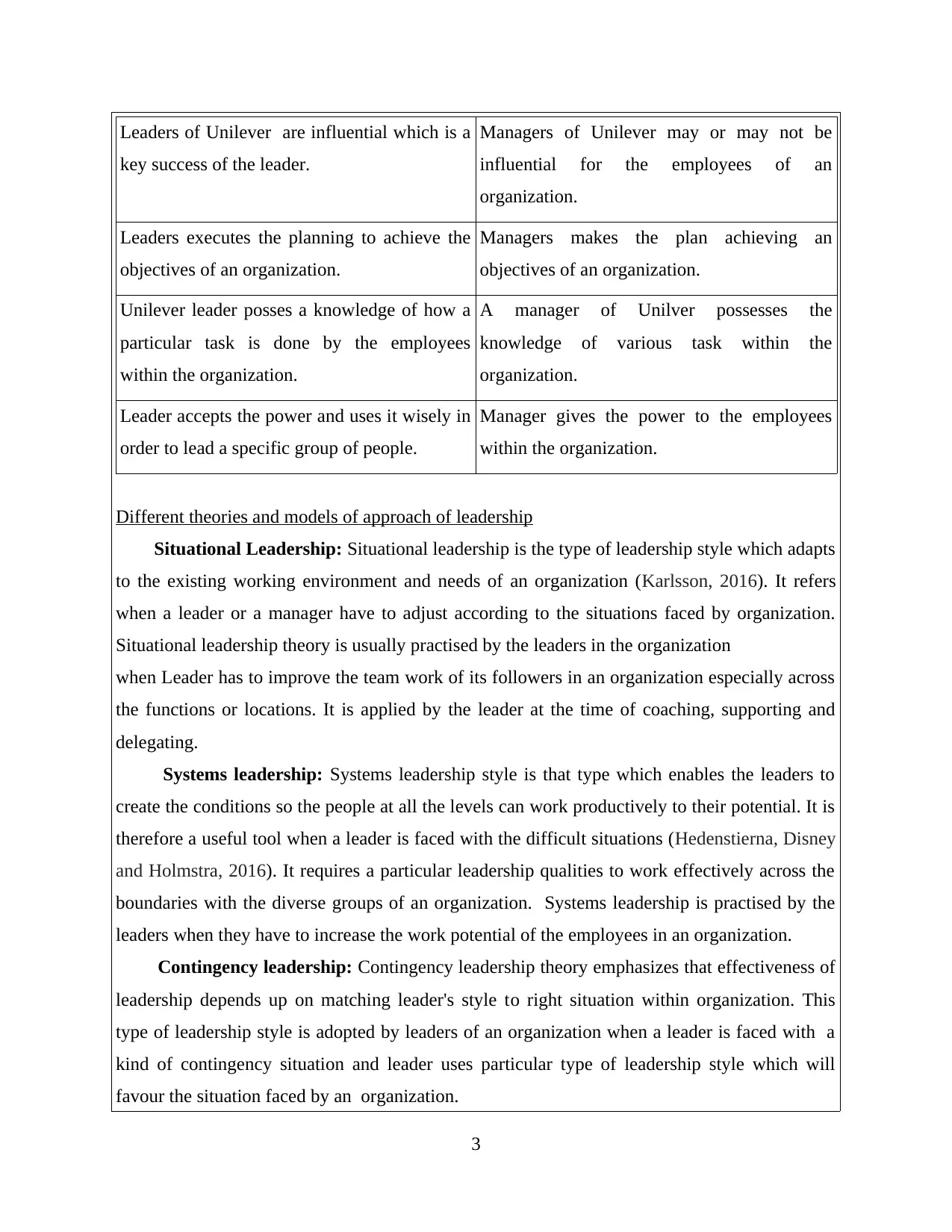
Leaders of Unilever are influential which is a
key success of the leader.
Managers of Unilever may or may not be
influential for the employees of an
organization.
Leaders executes the planning to achieve the
objectives of an organization.
Managers makes the plan achieving an
objectives of an organization.
Unilever leader posses a knowledge of how a
particular task is done by the employees
within the organization.
A manager of Unilver possesses the
knowledge of various task within the
organization.
Leader accepts the power and uses it wisely in
order to lead a specific group of people.
Manager gives the power to the employees
within the organization.
Different theories and models of approach of leadership
Situational Leadership: Situational leadership is the type of leadership style which adapts
to the existing working environment and needs of an organization (Karlsson, 2016). It refers
when a leader or a manager have to adjust according to the situations faced by organization.
Situational leadership theory is usually practised by the leaders in the organization
when Leader has to improve the team work of its followers in an organization especially across
the functions or locations. It is applied by the leader at the time of coaching, supporting and
delegating.
Systems leadership: Systems leadership style is that type which enables the leaders to
create the conditions so the people at all the levels can work productively to their potential. It is
therefore a useful tool when a leader is faced with the difficult situations (Hedenstierna, Disney
and Holmstra, 2016). It requires a particular leadership qualities to work effectively across the
boundaries with the diverse groups of an organization. Systems leadership is practised by the
leaders when they have to increase the work potential of the employees in an organization.
Contingency leadership: Contingency leadership theory emphasizes that effectiveness of
leadership depends up on matching leader's style to right situation within organization. This
type of leadership style is adopted by leaders of an organization when a leader is faced with a
kind of contingency situation and leader uses particular type of leadership style which will
favour the situation faced by an organization.
3
key success of the leader.
Managers of Unilever may or may not be
influential for the employees of an
organization.
Leaders executes the planning to achieve the
objectives of an organization.
Managers makes the plan achieving an
objectives of an organization.
Unilever leader posses a knowledge of how a
particular task is done by the employees
within the organization.
A manager of Unilver possesses the
knowledge of various task within the
organization.
Leader accepts the power and uses it wisely in
order to lead a specific group of people.
Manager gives the power to the employees
within the organization.
Different theories and models of approach of leadership
Situational Leadership: Situational leadership is the type of leadership style which adapts
to the existing working environment and needs of an organization (Karlsson, 2016). It refers
when a leader or a manager have to adjust according to the situations faced by organization.
Situational leadership theory is usually practised by the leaders in the organization
when Leader has to improve the team work of its followers in an organization especially across
the functions or locations. It is applied by the leader at the time of coaching, supporting and
delegating.
Systems leadership: Systems leadership style is that type which enables the leaders to
create the conditions so the people at all the levels can work productively to their potential. It is
therefore a useful tool when a leader is faced with the difficult situations (Hedenstierna, Disney
and Holmstra, 2016). It requires a particular leadership qualities to work effectively across the
boundaries with the diverse groups of an organization. Systems leadership is practised by the
leaders when they have to increase the work potential of the employees in an organization.
Contingency leadership: Contingency leadership theory emphasizes that effectiveness of
leadership depends up on matching leader's style to right situation within organization. This
type of leadership style is adopted by leaders of an organization when a leader is faced with a
kind of contingency situation and leader uses particular type of leadership style which will
favour the situation faced by an organization.
3
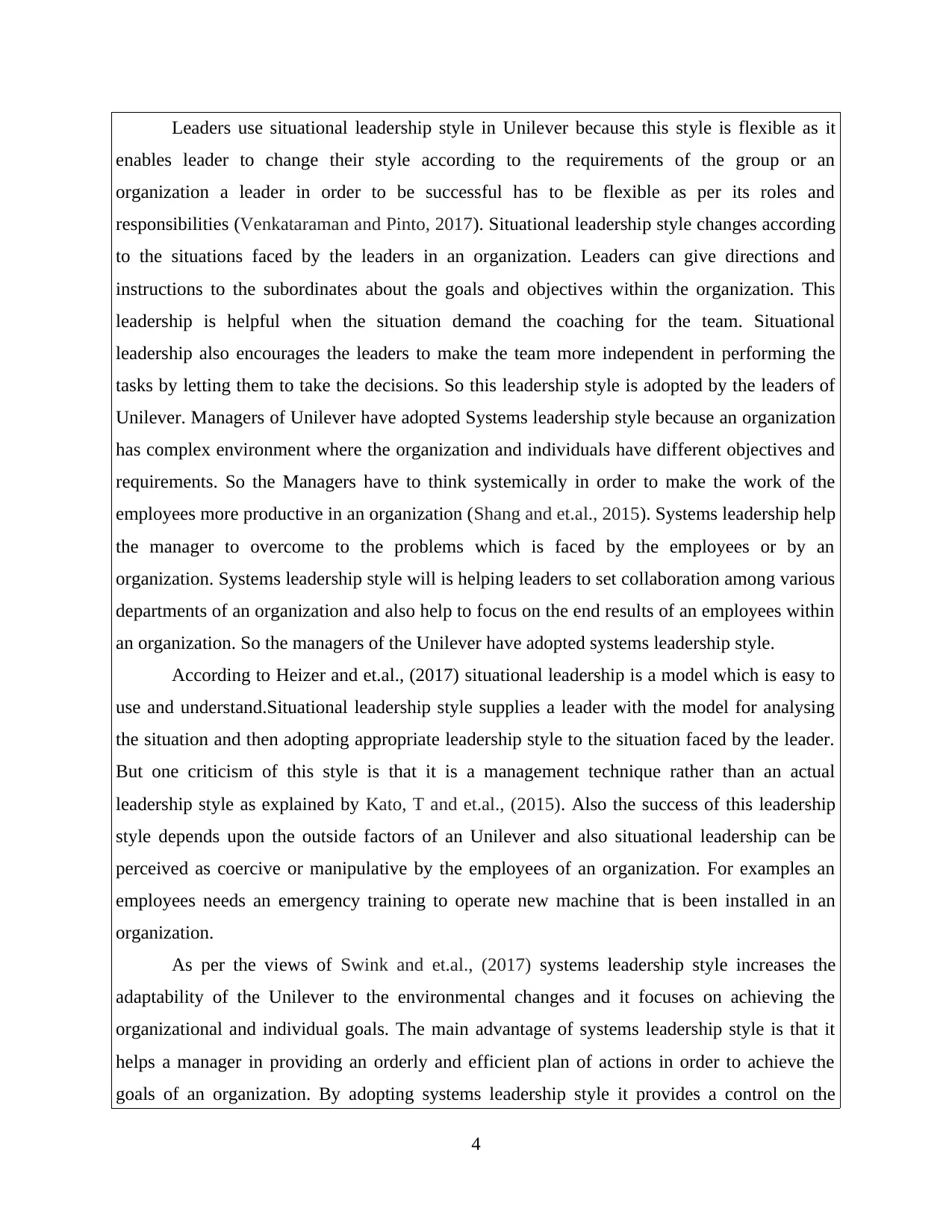
Leaders use situational leadership style in Unilever because this style is flexible as it
enables leader to change their style according to the requirements of the group or an
organization a leader in order to be successful has to be flexible as per its roles and
responsibilities (Venkataraman and Pinto, 2017). Situational leadership style changes according
to the situations faced by the leaders in an organization. Leaders can give directions and
instructions to the subordinates about the goals and objectives within the organization. This
leadership is helpful when the situation demand the coaching for the team. Situational
leadership also encourages the leaders to make the team more independent in performing the
tasks by letting them to take the decisions. So this leadership style is adopted by the leaders of
Unilever. Managers of Unilever have adopted Systems leadership style because an organization
has complex environment where the organization and individuals have different objectives and
requirements. So the Managers have to think systemically in order to make the work of the
employees more productive in an organization (Shang and et.al., 2015). Systems leadership help
the manager to overcome to the problems which is faced by the employees or by an
organization. Systems leadership style will is helping leaders to set collaboration among various
departments of an organization and also help to focus on the end results of an employees within
an organization. So the managers of the Unilever have adopted systems leadership style.
According to Heizer and et.al., (2017) situational leadership is a model which is easy to
use and understand.Situational leadership style supplies a leader with the model for analysing
the situation and then adopting appropriate leadership style to the situation faced by the leader.
But one criticism of this style is that it is a management technique rather than an actual
leadership style as explained by Kato, T and et.al., (2015). Also the success of this leadership
style depends upon the outside factors of an Unilever and also situational leadership can be
perceived as coercive or manipulative by the employees of an organization. For examples an
employees needs an emergency training to operate new machine that is been installed in an
organization.
As per the views of Swink and et.al., (2017) systems leadership style increases the
adaptability of the Unilever to the environmental changes and it focuses on achieving the
organizational and individual goals. The main advantage of systems leadership style is that it
helps a manager in providing an orderly and efficient plan of actions in order to achieve the
goals of an organization. By adopting systems leadership style it provides a control on the
4
enables leader to change their style according to the requirements of the group or an
organization a leader in order to be successful has to be flexible as per its roles and
responsibilities (Venkataraman and Pinto, 2017). Situational leadership style changes according
to the situations faced by the leaders in an organization. Leaders can give directions and
instructions to the subordinates about the goals and objectives within the organization. This
leadership is helpful when the situation demand the coaching for the team. Situational
leadership also encourages the leaders to make the team more independent in performing the
tasks by letting them to take the decisions. So this leadership style is adopted by the leaders of
Unilever. Managers of Unilever have adopted Systems leadership style because an organization
has complex environment where the organization and individuals have different objectives and
requirements. So the Managers have to think systemically in order to make the work of the
employees more productive in an organization (Shang and et.al., 2015). Systems leadership help
the manager to overcome to the problems which is faced by the employees or by an
organization. Systems leadership style will is helping leaders to set collaboration among various
departments of an organization and also help to focus on the end results of an employees within
an organization. So the managers of the Unilever have adopted systems leadership style.
According to Heizer and et.al., (2017) situational leadership is a model which is easy to
use and understand.Situational leadership style supplies a leader with the model for analysing
the situation and then adopting appropriate leadership style to the situation faced by the leader.
But one criticism of this style is that it is a management technique rather than an actual
leadership style as explained by Kato, T and et.al., (2015). Also the success of this leadership
style depends upon the outside factors of an Unilever and also situational leadership can be
perceived as coercive or manipulative by the employees of an organization. For examples an
employees needs an emergency training to operate new machine that is been installed in an
organization.
As per the views of Swink and et.al., (2017) systems leadership style increases the
adaptability of the Unilever to the environmental changes and it focuses on achieving the
organizational and individual goals. The main advantage of systems leadership style is that it
helps a manager in providing an orderly and efficient plan of actions in order to achieve the
goals of an organization. By adopting systems leadership style it provides a control on the
4
⊘ This is a preview!⊘
Do you want full access?
Subscribe today to unlock all pages.

Trusted by 1+ million students worldwide
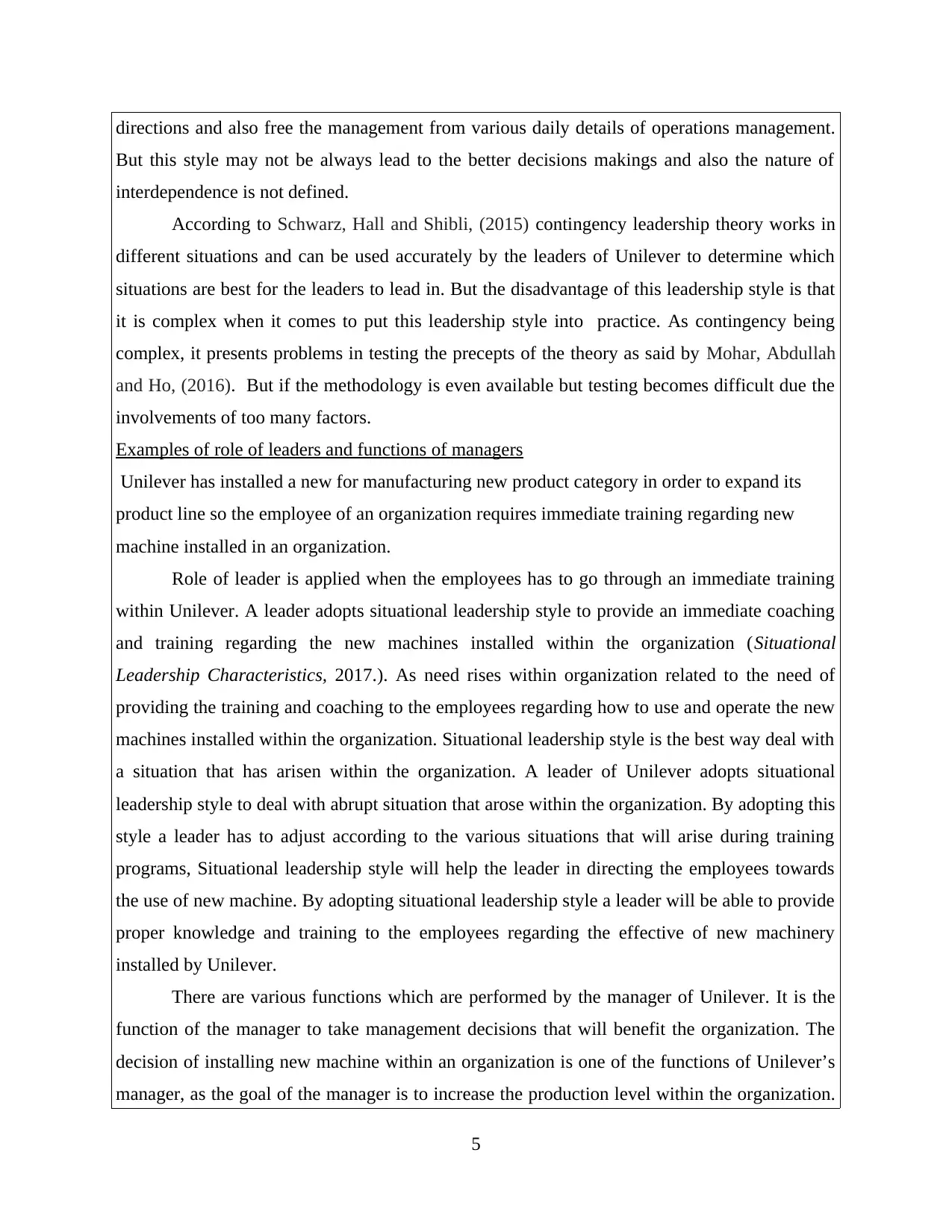
directions and also free the management from various daily details of operations management.
But this style may not be always lead to the better decisions makings and also the nature of
interdependence is not defined.
According to Schwarz, Hall and Shibli, (2015) contingency leadership theory works in
different situations and can be used accurately by the leaders of Unilever to determine which
situations are best for the leaders to lead in. But the disadvantage of this leadership style is that
it is complex when it comes to put this leadership style into practice. As contingency being
complex, it presents problems in testing the precepts of the theory as said by Mohar, Abdullah
and Ho, (2016). But if the methodology is even available but testing becomes difficult due the
involvements of too many factors.
Examples of role of leaders and functions of managers
Unilever has installed a new for manufacturing new product category in order to expand its
product line so the employee of an organization requires immediate training regarding new
machine installed in an organization.
Role of leader is applied when the employees has to go through an immediate training
within Unilever. A leader adopts situational leadership style to provide an immediate coaching
and training regarding the new machines installed within the organization (Situational
Leadership Characteristics, 2017.). As need rises within organization related to the need of
providing the training and coaching to the employees regarding how to use and operate the new
machines installed within the organization. Situational leadership style is the best way deal with
a situation that has arisen within the organization. A leader of Unilever adopts situational
leadership style to deal with abrupt situation that arose within the organization. By adopting this
style a leader has to adjust according to the various situations that will arise during training
programs, Situational leadership style will help the leader in directing the employees towards
the use of new machine. By adopting situational leadership style a leader will be able to provide
proper knowledge and training to the employees regarding the effective of new machinery
installed by Unilever.
There are various functions which are performed by the manager of Unilever. It is the
function of the manager to take management decisions that will benefit the organization. The
decision of installing new machine within an organization is one of the functions of Unilever’s
manager, as the goal of the manager is to increase the production level within the organization.
5
But this style may not be always lead to the better decisions makings and also the nature of
interdependence is not defined.
According to Schwarz, Hall and Shibli, (2015) contingency leadership theory works in
different situations and can be used accurately by the leaders of Unilever to determine which
situations are best for the leaders to lead in. But the disadvantage of this leadership style is that
it is complex when it comes to put this leadership style into practice. As contingency being
complex, it presents problems in testing the precepts of the theory as said by Mohar, Abdullah
and Ho, (2016). But if the methodology is even available but testing becomes difficult due the
involvements of too many factors.
Examples of role of leaders and functions of managers
Unilever has installed a new for manufacturing new product category in order to expand its
product line so the employee of an organization requires immediate training regarding new
machine installed in an organization.
Role of leader is applied when the employees has to go through an immediate training
within Unilever. A leader adopts situational leadership style to provide an immediate coaching
and training regarding the new machines installed within the organization (Situational
Leadership Characteristics, 2017.). As need rises within organization related to the need of
providing the training and coaching to the employees regarding how to use and operate the new
machines installed within the organization. Situational leadership style is the best way deal with
a situation that has arisen within the organization. A leader of Unilever adopts situational
leadership style to deal with abrupt situation that arose within the organization. By adopting this
style a leader has to adjust according to the various situations that will arise during training
programs, Situational leadership style will help the leader in directing the employees towards
the use of new machine. By adopting situational leadership style a leader will be able to provide
proper knowledge and training to the employees regarding the effective of new machinery
installed by Unilever.
There are various functions which are performed by the manager of Unilever. It is the
function of the manager to take management decisions that will benefit the organization. The
decision of installing new machine within an organization is one of the functions of Unilever’s
manager, as the goal of the manager is to increase the production level within the organization.
5
Paraphrase This Document
Need a fresh take? Get an instant paraphrase of this document with our AI Paraphraser
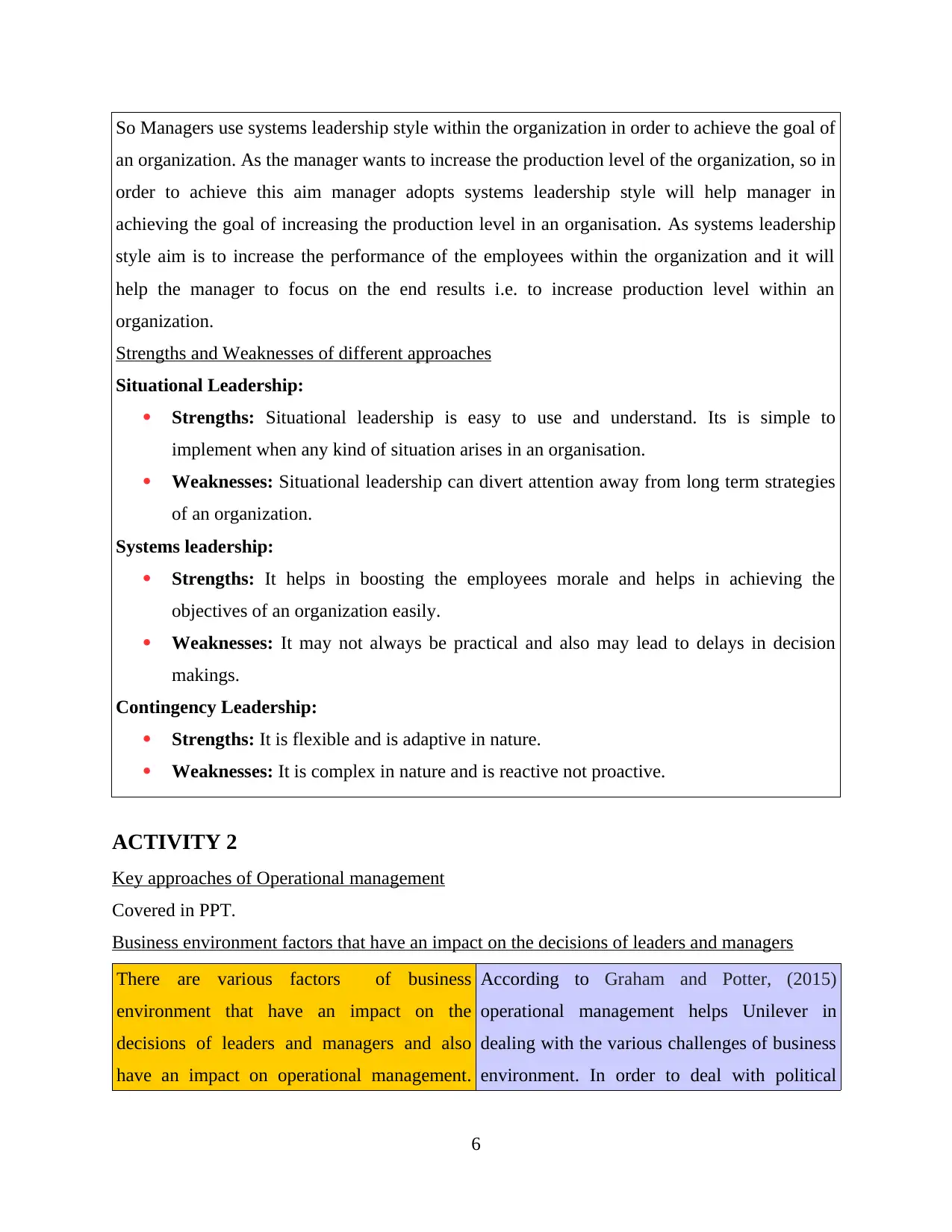
So Managers use systems leadership style within the organization in order to achieve the goal of
an organization. As the manager wants to increase the production level of the organization, so in
order to achieve this aim manager adopts systems leadership style will help manager in
achieving the goal of increasing the production level in an organisation. As systems leadership
style aim is to increase the performance of the employees within the organization and it will
help the manager to focus on the end results i.e. to increase production level within an
organization.
Strengths and Weaknesses of different approaches
Situational Leadership:
Strengths: Situational leadership is easy to use and understand. Its is simple to
implement when any kind of situation arises in an organisation.
Weaknesses: Situational leadership can divert attention away from long term strategies
of an organization.
Systems leadership:
Strengths: It helps in boosting the employees morale and helps in achieving the
objectives of an organization easily.
Weaknesses: It may not always be practical and also may lead to delays in decision
makings.
Contingency Leadership:
Strengths: It is flexible and is adaptive in nature.
Weaknesses: It is complex in nature and is reactive not proactive.
ACTIVITY 2
Key approaches of Operational management
Covered in PPT.
Business environment factors that have an impact on the decisions of leaders and managers
There are various factors of business
environment that have an impact on the
decisions of leaders and managers and also
have an impact on operational management.
According to Graham and Potter, (2015)
operational management helps Unilever in
dealing with the various challenges of business
environment. In order to deal with political
6
an organization. As the manager wants to increase the production level of the organization, so in
order to achieve this aim manager adopts systems leadership style will help manager in
achieving the goal of increasing the production level in an organisation. As systems leadership
style aim is to increase the performance of the employees within the organization and it will
help the manager to focus on the end results i.e. to increase production level within an
organization.
Strengths and Weaknesses of different approaches
Situational Leadership:
Strengths: Situational leadership is easy to use and understand. Its is simple to
implement when any kind of situation arises in an organisation.
Weaknesses: Situational leadership can divert attention away from long term strategies
of an organization.
Systems leadership:
Strengths: It helps in boosting the employees morale and helps in achieving the
objectives of an organization easily.
Weaknesses: It may not always be practical and also may lead to delays in decision
makings.
Contingency Leadership:
Strengths: It is flexible and is adaptive in nature.
Weaknesses: It is complex in nature and is reactive not proactive.
ACTIVITY 2
Key approaches of Operational management
Covered in PPT.
Business environment factors that have an impact on the decisions of leaders and managers
There are various factors of business
environment that have an impact on the
decisions of leaders and managers and also
have an impact on operational management.
According to Graham and Potter, (2015)
operational management helps Unilever in
dealing with the various challenges of business
environment. In order to deal with political
6
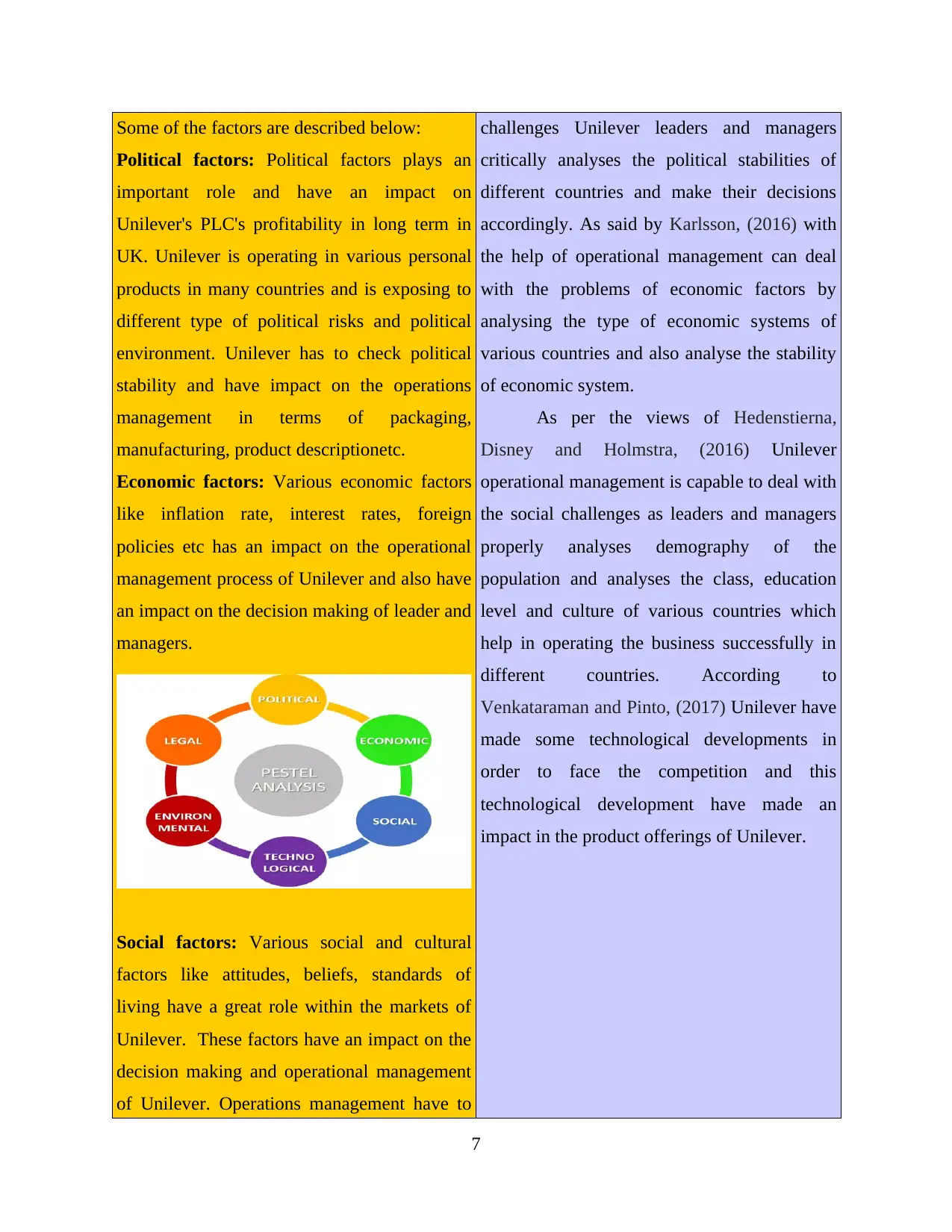
Some of the factors are described below:
Political factors: Political factors plays an
important role and have an impact on
Unilever's PLC's profitability in long term in
UK. Unilever is operating in various personal
products in many countries and is exposing to
different type of political risks and political
environment. Unilever has to check political
stability and have impact on the operations
management in terms of packaging,
manufacturing, product descriptionetc.
Economic factors: Various economic factors
like inflation rate, interest rates, foreign
policies etc has an impact on the operational
management process of Unilever and also have
an impact on the decision making of leader and
managers.
Social factors: Various social and cultural
factors like attitudes, beliefs, standards of
living have a great role within the markets of
Unilever. These factors have an impact on the
decision making and operational management
of Unilever. Operations management have to
challenges Unilever leaders and managers
critically analyses the political stabilities of
different countries and make their decisions
accordingly. As said by Karlsson, (2016) with
the help of operational management can deal
with the problems of economic factors by
analysing the type of economic systems of
various countries and also analyse the stability
of economic system.
As per the views of Hedenstierna,
Disney and Holmstra, (2016) Unilever
operational management is capable to deal with
the social challenges as leaders and managers
properly analyses demography of the
population and analyses the class, education
level and culture of various countries which
help in operating the business successfully in
different countries. According to
Venkataraman and Pinto, (2017) Unilever have
made some technological developments in
order to face the competition and this
technological development have made an
impact in the product offerings of Unilever.
7
Political factors: Political factors plays an
important role and have an impact on
Unilever's PLC's profitability in long term in
UK. Unilever is operating in various personal
products in many countries and is exposing to
different type of political risks and political
environment. Unilever has to check political
stability and have impact on the operations
management in terms of packaging,
manufacturing, product descriptionetc.
Economic factors: Various economic factors
like inflation rate, interest rates, foreign
policies etc has an impact on the operational
management process of Unilever and also have
an impact on the decision making of leader and
managers.
Social factors: Various social and cultural
factors like attitudes, beliefs, standards of
living have a great role within the markets of
Unilever. These factors have an impact on the
decision making and operational management
of Unilever. Operations management have to
challenges Unilever leaders and managers
critically analyses the political stabilities of
different countries and make their decisions
accordingly. As said by Karlsson, (2016) with
the help of operational management can deal
with the problems of economic factors by
analysing the type of economic systems of
various countries and also analyse the stability
of economic system.
As per the views of Hedenstierna,
Disney and Holmstra, (2016) Unilever
operational management is capable to deal with
the social challenges as leaders and managers
properly analyses demography of the
population and analyses the class, education
level and culture of various countries which
help in operating the business successfully in
different countries. According to
Venkataraman and Pinto, (2017) Unilever have
made some technological developments in
order to face the competition and this
technological development have made an
impact in the product offerings of Unilever.
7
⊘ This is a preview!⊘
Do you want full access?
Subscribe today to unlock all pages.

Trusted by 1+ million students worldwide
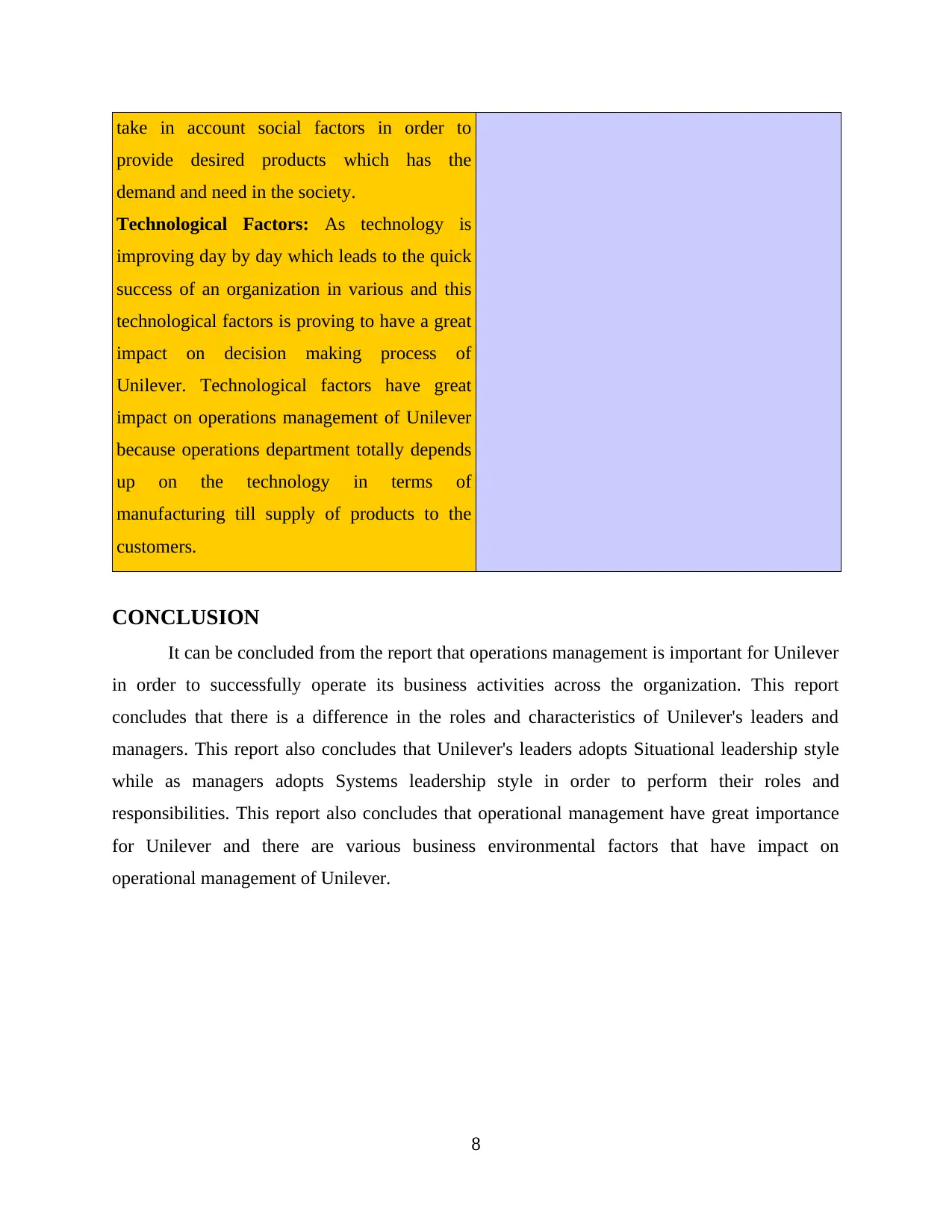
take in account social factors in order to
provide desired products which has the
demand and need in the society.
Technological Factors: As technology is
improving day by day which leads to the quick
success of an organization in various and this
technological factors is proving to have a great
impact on decision making process of
Unilever. Technological factors have great
impact on operations management of Unilever
because operations department totally depends
up on the technology in terms of
manufacturing till supply of products to the
customers.
CONCLUSION
It can be concluded from the report that operations management is important for Unilever
in order to successfully operate its business activities across the organization. This report
concludes that there is a difference in the roles and characteristics of Unilever's leaders and
managers. This report also concludes that Unilever's leaders adopts Situational leadership style
while as managers adopts Systems leadership style in order to perform their roles and
responsibilities. This report also concludes that operational management have great importance
for Unilever and there are various business environmental factors that have impact on
operational management of Unilever.
8
provide desired products which has the
demand and need in the society.
Technological Factors: As technology is
improving day by day which leads to the quick
success of an organization in various and this
technological factors is proving to have a great
impact on decision making process of
Unilever. Technological factors have great
impact on operations management of Unilever
because operations department totally depends
up on the technology in terms of
manufacturing till supply of products to the
customers.
CONCLUSION
It can be concluded from the report that operations management is important for Unilever
in order to successfully operate its business activities across the organization. This report
concludes that there is a difference in the roles and characteristics of Unilever's leaders and
managers. This report also concludes that Unilever's leaders adopts Situational leadership style
while as managers adopts Systems leadership style in order to perform their roles and
responsibilities. This report also concludes that operational management have great importance
for Unilever and there are various business environmental factors that have impact on
operational management of Unilever.
8
Paraphrase This Document
Need a fresh take? Get an instant paraphrase of this document with our AI Paraphraser
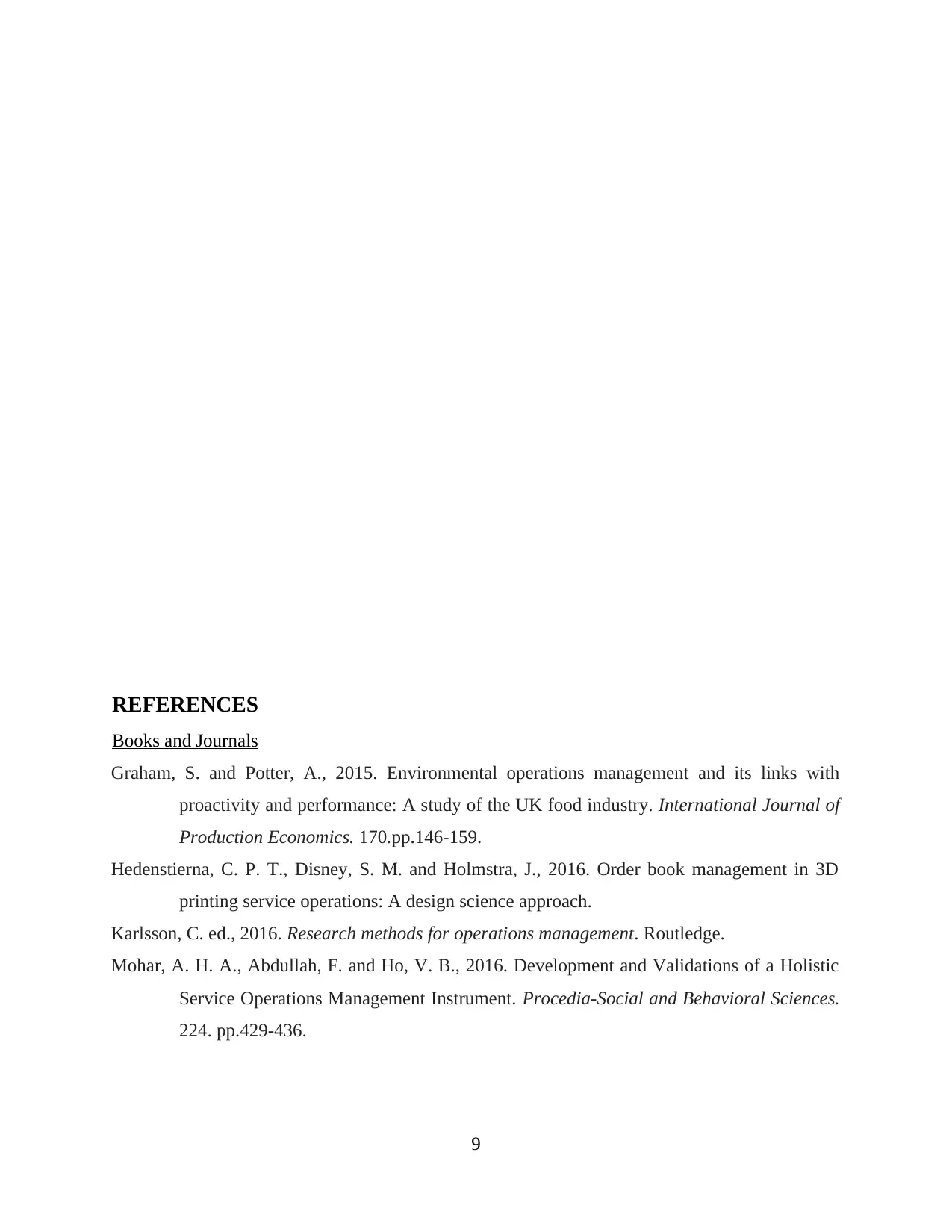
REFERENCES
Books and Journals
Graham, S. and Potter, A., 2015. Environmental operations management and its links with
proactivity and performance: A study of the UK food industry. International Journal of
Production Economics. 170.pp.146-159.
Hedenstierna, C. P. T., Disney, S. M. and Holmstra, J., 2016. Order book management in 3D
printing service operations: A design science approach.
Karlsson, C. ed., 2016. Research methods for operations management. Routledge.
Mohar, A. H. A., Abdullah, F. and Ho, V. B., 2016. Development and Validations of a Holistic
Service Operations Management Instrument. Procedia-Social and Behavioral Sciences.
224. pp.429-436.
9
Books and Journals
Graham, S. and Potter, A., 2015. Environmental operations management and its links with
proactivity and performance: A study of the UK food industry. International Journal of
Production Economics. 170.pp.146-159.
Hedenstierna, C. P. T., Disney, S. M. and Holmstra, J., 2016. Order book management in 3D
printing service operations: A design science approach.
Karlsson, C. ed., 2016. Research methods for operations management. Routledge.
Mohar, A. H. A., Abdullah, F. and Ho, V. B., 2016. Development and Validations of a Holistic
Service Operations Management Instrument. Procedia-Social and Behavioral Sciences.
224. pp.429-436.
9
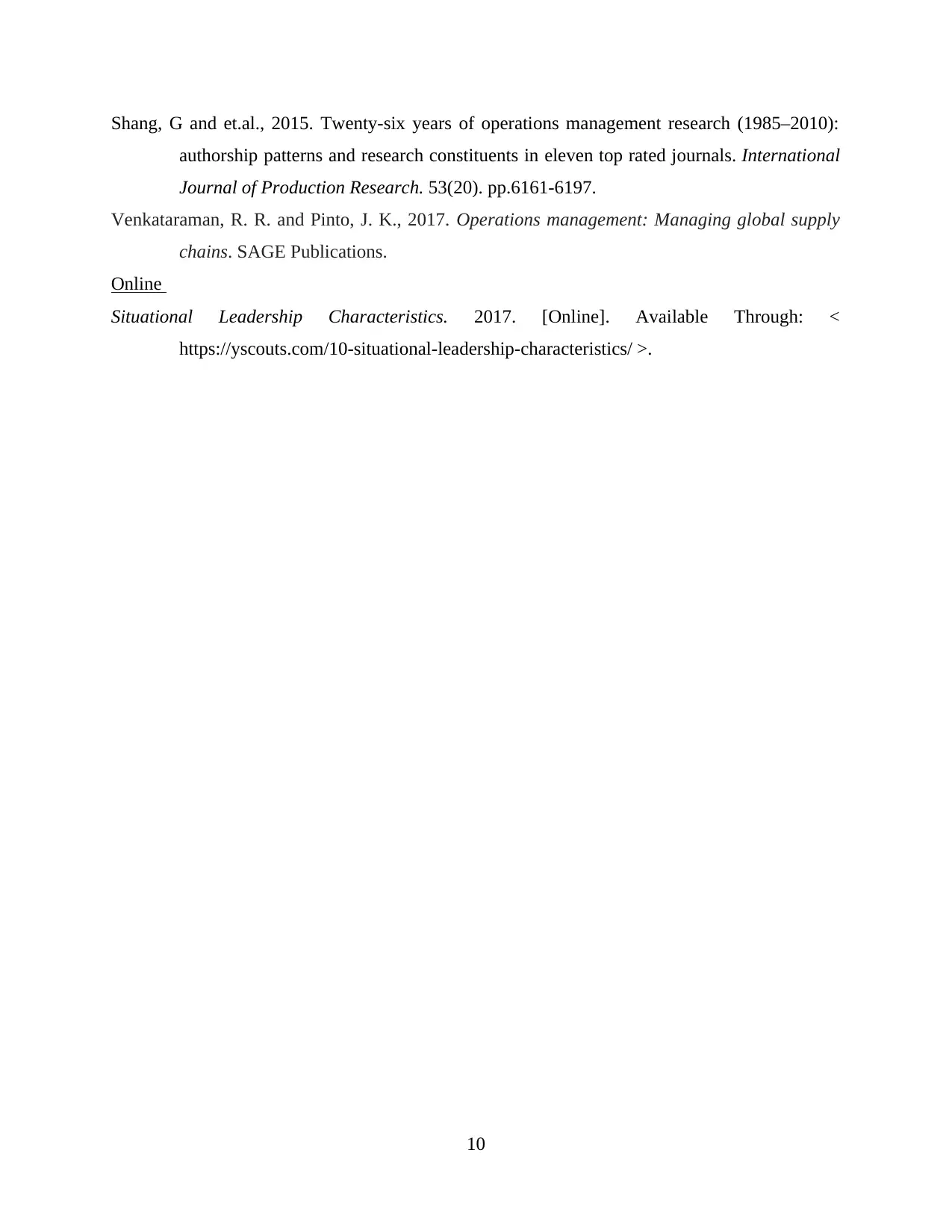
Shang, G and et.al., 2015. Twenty-six years of operations management research (1985–2010):
authorship patterns and research constituents in eleven top rated journals. International
Journal of Production Research. 53(20). pp.6161-6197.
Venkataraman, R. R. and Pinto, J. K., 2017. Operations management: Managing global supply
chains. SAGE Publications.
Online
Situational Leadership Characteristics. 2017. [Online]. Available Through: <
https://yscouts.com/10-situational-leadership-characteristics/ >.
10
authorship patterns and research constituents in eleven top rated journals. International
Journal of Production Research. 53(20). pp.6161-6197.
Venkataraman, R. R. and Pinto, J. K., 2017. Operations management: Managing global supply
chains. SAGE Publications.
Online
Situational Leadership Characteristics. 2017. [Online]. Available Through: <
https://yscouts.com/10-situational-leadership-characteristics/ >.
10
⊘ This is a preview!⊘
Do you want full access?
Subscribe today to unlock all pages.

Trusted by 1+ million students worldwide
1 out of 12
Related Documents
Your All-in-One AI-Powered Toolkit for Academic Success.
+13062052269
info@desklib.com
Available 24*7 on WhatsApp / Email
![[object Object]](/_next/static/media/star-bottom.7253800d.svg)
Unlock your academic potential
Copyright © 2020–2026 A2Z Services. All Rights Reserved. Developed and managed by ZUCOL.





